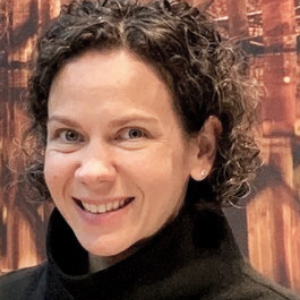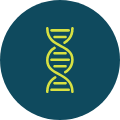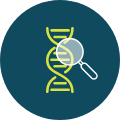Considering genetic testing? Emily Place is an expert with answers to your questions
Emily Place is a senior genetic counselor at Massachusetts Eye and Ear, a Boston hospital that treats patients with eye, ear, nose, and related disorders. Working closely with ophthalmologists and other eye care providers, she helps those living with an inherited retinal disease (IRD) to learn more about the genetic testing process and interpret the results after they’ve received a test. She walked us through the fundamentals of her job.

Emily Place, MS, LCGC
Q: At what point does someone who’s experiencing vision loss meet with a genetic counselor?
A: A genetic counselor can be involved at any point in a patient’s care. Typically, they have been clinically diagnosed with an inherited retinal disease and been recommended or referred to a genetic counselor by their ophthalmologist or optometrist. Or they may have had a clinical diagnosis for several years, and genetic testing is now being recommended for the first time.
Q: What happens during a typical first visit?
A: It starts with a discussion about the patient’s medical and ocular history and questions about their family’s history: Do other family members have similar vision concerns? Not everyone knows their family’s details, and that’s fine, but we try to get a sense of three generations if possible. The hardest question we ask is the ages of your family members—that seems to trip most people up!
Q: As a genetic counselor, how does this information help you?
A: We use it to assess how we think the patient’s condition is being inherited within the family. Our predictions are better informed through genetic testing, though, so we also discuss the benefits and limitations for pursuing genetic testing, what testing options are available, what a patient can and can’t learn through genetic testing, and the type of results we would get back from a test.
Q: How does genetic testing work?
A: The human genome has about 20,000 genes, and each one is made up of specific letters that have to be in a certain order for the gene to function properly. Think of genetic testing as spell-checking the genes. We know we’ll find spelling variations in our genes—that’s what makes us different from one another. For genetic testing, though, the lab is focused on looking at variations they think would cause a gene to function incorrectly and result in a certain condition.
Q: Why is it important to study the variations in my genes?
A: Sometimes we can identify a result we weren’t necessarily expecting. We’re not good at picking someone’s genetic diagnosis just based on their family history and clinical history alone. And sometimes we can get results back from genetic testing that may put children or siblings at a higher risk for having something similar—something we wouldn’t have initially thought based on someone’s clinical history.
Q: Is the information revealed in a genetic test kept private?
A: Certainly. The testing we recommend is focused on the genes that cause these inherited retinal conditions. It doesn’t look at any other genetic information. That information is then made part of the patient’s medical record and shared with the provider that’s ordering the testing, but not on a wider scale.
The hardest question we ask is the ages of your family members—that seems to trip most people up!
Q: Do you perform the actual genetic test?
A: No. The genetic counselor is there to guide the patient through the testing process. We can facilitate testing—help to collect a blood or saliva sample and coordinate getting it to the lab for analysis. And we’re available to receive the results and walk the patient through what they mean.
Q: After the healthcare provider orders a genetic test for a patient, can they initiate the test from home?
A: Sure. The lab can send a sample kit, which includes a saliva kit or what’s called a buccal swab—which means collecting DNA from cells on the inside of a person’s cheek—directly to the patient’s home. They collect their sample, seal it up, and mail it back.
Q: So what are the potential results of a genetic test?
A: There are three possible outcomes. A positive result means the test successfully identified a genetic variation or variations within a gene that we think is the likely underlying explanation for that person’s retinal condition. In that case, we can now ask: What does that mean? What do we know about this particular gene? How is this gene inherited?
The test can also come back negative, meaning it didn’t identify a clear genetic explanation in the genes we were testing for. A negative result doesn’t necessarily rule out an inherited condition; it may mean that we weren’t able to identify the underlying genetic explanation because it’s a gene we haven’t identified yet.
The third possibility is indeterminate. That’s when testing identifies a variation or variations within a gene that could be—or is—associated with their clinical diagnosis, but we’re not sure if it’s actually the underlying explanation. In that case, testing additional family members may clarify the result.
Q: How is a genetic diagnosis different than a clinical diagnosis?
A: In order to know if someone qualifies for certain types of therapies, we have to know what underlying gene is causing their condition. We can drill down to the specific mutation—that specific identified spelling error we talked about before. Knowing that information can be helpful when thinking about a patient’s eligibility for genetic-based therapies or possible clinical trials going forward.
Q: What can a person do with their genetic test results?
A: It depends on their results. If genetic testing identifies that they are a candidate for a licensed therapy or a clinical trial, the genetic counselor may help connect them with the appropriate researchers. As more clinical trials become available in research studies, we’re always keeping tabs, so if we see a patient with this diagnosis we know it may be an option for them.
Q: Can individuals still see a genetic counselor if they live far from a medical facility?
A: Absolutely. Even before the pandemic, these counseling sessions and discussions could happen as a virtual visit. There are a number of groups and companies that work in conjunction with a patient’s ophthalmologist, optometrist, or primary care provider to offer telemedicine—the patient just needs to ask.
| Genetics 101 Need a refresher on the basic units of human genetics? |
|||||||||||||||||||||||||||||||||||||||||||||||
|
- National Human Genome Research Institute. Gene. Accessed 12/3/2024. https://www.genome.gov/genetics-glossary/Gene
- National Human Genome Research Institute. Genotype. Accessed 12/3/2024. https://www.genome.gov/genetics-glossary/genotype
- National Human Genome Research Institute. Deoxyribonucleic Acid (DNA) Fact Sheet. Accessed 12/3/2024. https://www.genome.gov/about-genomics/fact-sheets/Deoxyribonucleic-Acid-Fact-Sheet
- National Human Genome Research Institute. Phenotype. Accessed 12/3/2024. https://www.genome.gov/genetics-glossary/Phenotype

Emily Place, MS, LCGC
Emily Place, MS, LCGC is a senior genetic counselor at the Massachusetts Eye and Ear, which is a Harvard Medical School teaching hospital and an international center for treatment and research. Emily has guided hundreds of patients through the details of genetic testing and helped them interpret the results from their genetic test. She was a featured guest in Season 3 of the Eye Know—Do You? Podcast.



